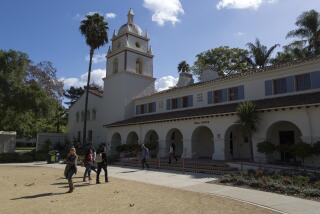Penn State charges raise questions about Paternoâs culpability
ALLENTOWN, Pa. â The charges filed last week accusing three former Penn State administrators of engaging in a âconspiracy of silenceâ to cover up child sexual abuse allegations against Jerry Sandusky raise questions about whether legendary football Coach Joe Paterno could have been charged if he were still living.
Former university President Graham Spanier and the others face charges including perjury and endangering the welfare of children.
âTo be fair and consistent, you have to read this as a posthumous indictment of Joe Paterno,â said law professor Wes Oliver of Duquesne University in Pittsburgh.
Paterno died at age 85 in January, about two months after the Penn State Board of Trustees fired him for mishandling the allegations against Sandusky, Paternoâs former assistant who has since been sentenced to 30 to 60 years in prison for molesting boys.
If Spanier, university Athletic Director Tim Curley and former administrator Gary Schultz had been charged while Paterno escaped prosecution, the former administrators probably would have complained that the coach was getting special treatment, Oliver said.
Those who have watched the case said the grand jury presentment released Thursday paints Paterno as an active participant in the conspiracy.
âThe reality is that he knew. He knew early on, and he chose to protect the image of the football program and to protect Penn State,â said Jennifer Storm, a victims advocate who has worked with two of the young men Sandusky molested when they were boys.
But Bruce Antkowiak, a former federal prosecutor who teaches at St. Vincent College in Latrobe, Pa., said that without knowing everything that state prosecutors in the case know, itâs not fair to conclude that there was probable cause to charge Paterno.
âOnce the case is tried and all the evidence has come out, it might be possible to make that kind of retroactive assessment, but right now itâs too difficult,â Antkowiak said.
Curley and Schultz have maintained their innocence, and lawyers for Spanier denounced the new charges as âa politically motivated frame-up of an innocent man.â Curley, who was placed on administrative leave last year, and Schultz were previously charged with lying to a grand jury investigating allegations against Sandusky and for failing to report suspected child abuse.
Prosecutors allege that the three discussed a pair of incidents involving Sandusky, in 1998 and 2001, in âgreat detail,â the latter being an assault in a locker room shower reported by then-graduate assistant Mike McQueary.
In the 1998 episode, authorities investigated a motherâs complaint about Sandusky showering with her son, but she ultimately declined to press charges.
Paterno was the first university official to learn of McQuearyâs allegation against Sandusky in 2001. He passed the information to Curley the next day, setting off a flurry of activity among administrators. In handwritten notes, Schultz recorded plans to have Curley discuss the situation with Paterno and confront Sandusky.
The plan âinvolved using their legal requirement to report this information as a bargaining chip with Sandusky to get him to âconfessâ his problem,â the grand jury report says.
But weeks later, the plan changed. After discussing the incident with McQueary for the first time, Schultz emailed Curley outlining a plan in which Curley was to contact child welfare authorities regardless of Sanduskyâs reaction.
Curley responded via email the next day, saying that after discussing the plan with Paterno, he was uncomfortable reporting McQuearyâs allegation to authorities and suggested a return to the original plan to give Sandusky an ultimatum.
âI would indicate we feel there is a problem and we want to assist [Sandusky] to get professional help,â Curley wrote, according to the presentment.
Oliver said Curleyâs email to Schultz could be admissible as evidence in support of a charge that Paterno failed to report the abuse, even though he fulfilled his legal obligation to report the incident to his superior.
Retired federal prosecutor Seth Weber agreed that the documentary evidence might support a charge that Paterno was part of the alleged conspiracy. But the email from Curley to Schultz alone would probably be insufficient to get a conviction, he said.
âThe court of public opinion may have a posthumous indictment, but the court of law, thatâs a different arena,â he said.
More to Read
Sign up for Essential California
The most important California stories and recommendations in your inbox every morning.
You may occasionally receive promotional content from the Los Angeles Times.










